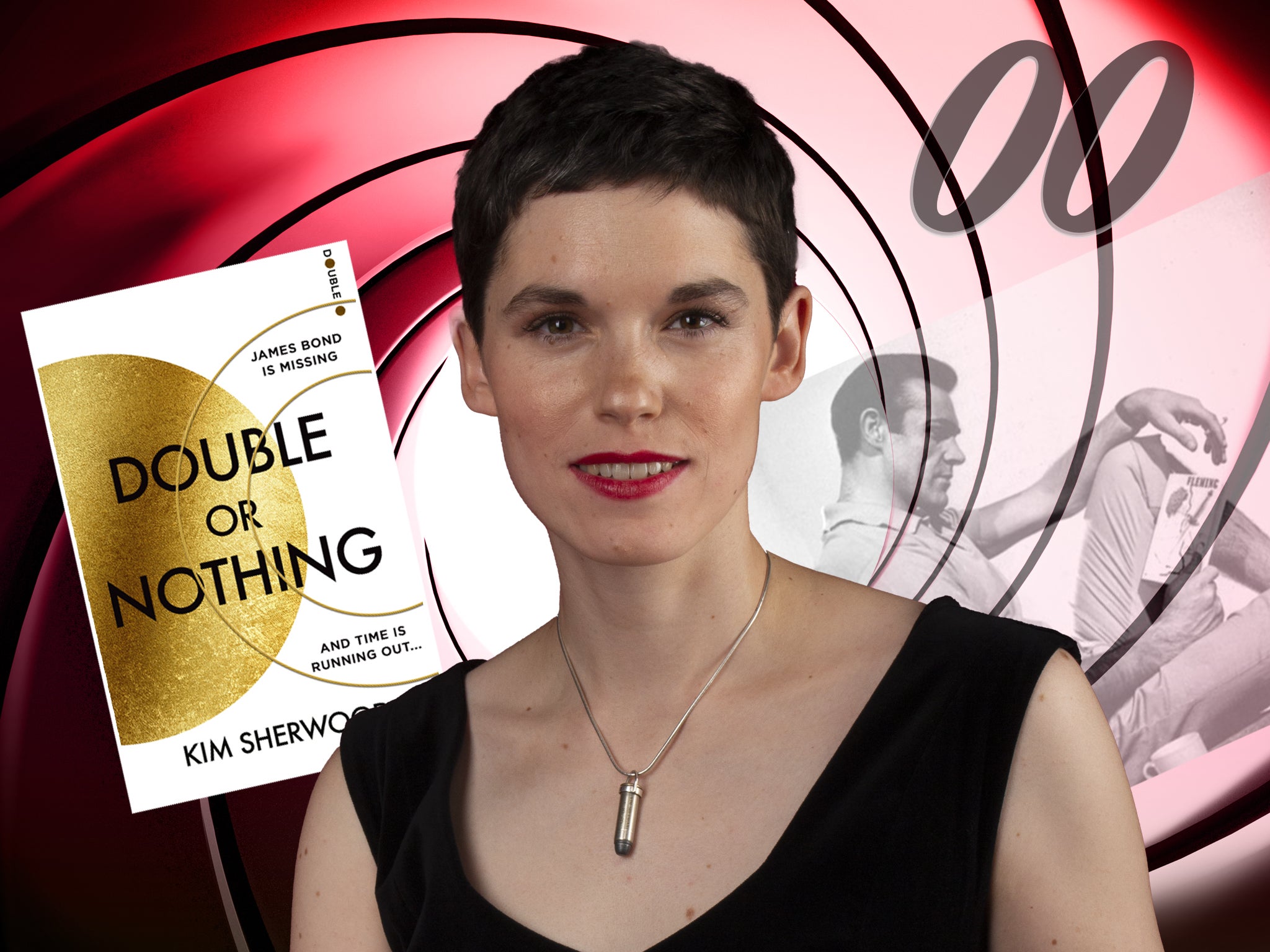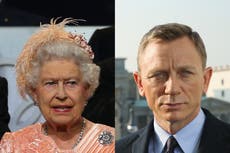‘Speculating about Bond is a national hobby’: Why 007’s fate is now in Kim Sherwood’s hands
With her electrifying new thriller ‘Double or Nothing’, the 33-year-old becomes the first female author to pick up Ian Fleming’s mantle. She talks to Kevin E G Perry about Britishness, the power of myth, and test-driving sports cars


Kim Sherwood wouldn’t make a very good spy. While working on Double or Nothing – the first in a new trilogy of thrillers the 33-year-old novelist is writing under the watchful eye of James Bond creator Ian Fleming’s estate – she was sent to test drive the Alpine A110 S. It’s a suitably luxurious sports car of the type Bond tends to prefer; the only hitch was that Sherwood doesn’t have a licence to drive, never mind a licence to kill. She was also under strict instructions not to reveal to Alpine employees why she was there.
Weaving through the cobbled streets of Edinburgh, the racing-car driver behind the wheel wondered aloud why Sherwood was scribbling down so many notes. “I told him I was writing a book about cars,” she remembers, speaking on a video call from her home in Bath. “It seemed like the easiest thing to say, but then he turned to me and said: ‘But you can’t drive?’” She laughs. Busted. “That’s true,” she stammered back. “It’s a very limited book.”
While Sherwood might not be the writer you’d want working on an encyclopaedia of automobiles, she was exactly who the Fleming family were looking for to solve their modern-day quandary: how does Bond fit into the world in 2022? After last year’s No Time to Die gave the Daniel Craig era of films a resoundingly final chapter, rumours have abounded about what the future might hold for the much-loved character. Would producers change 007’s ethnicity or gender? Maybe not. The latest gossip out of Pinewood suggests that the next onscreen Bond will simply be “younger and taller” than Craig’s version.
In Double or Nothing, Sherwood presents her own novel solution to the Bond question: get rid of him. At the outset of the book, 007 is missing, presumed kidnapped by a nefarious private military company known as Rattenfänger. In the aftermath of Bond’s disappearance, we follow his 00 colleagues at MI6 as they scour the globe.
There’s 003 Johanna Harwood, a former trauma surgeon and, perhaps inevitably, an old flame of Bond’s. She finds herself in a love triangle with another agent: a brilliant mathematician, Sid Bashir, who goes by the code name 009. Also on Bond’s trail is Joseph Dryden, 004, a former Special Forces soldier who was injured in Afghanistan and has since been given a brain implant that links him to MI6’s quantum computer, Q. Around this new team, Sherwood populates Double or Nothing with many familiar figures from Fleming’s original books. Some have graduated to new roles. Moneypenny, for example, has been promoted from faithful secretary to head of the 00 section.
In total, Fleming wrote 12 novels and two collections of short stories in the Bond series – a number long since outpaced by the 25 Bond films brought to the screen by Eon Productions. Since Fleming’s death in 1964, the task of keeping Bond alive on the page has fallen to a lengthy list of authors including Kingsley Amis, Sebastian Faulks and Anthony Horowitz.
Sherwood, whose award-winning debut novel Testament was published in 2018, had long dreamt of following in their footsteps. She got her first taste of Fleming’s Bond while growing up in north London, aged 12. “You ask yourself: ‘Is it OK that I’m reading this?’” she remembers. “It’s an adult world, not only because of the sex and the violence, but also because there’s a darkness to the character. There’s also the existentialism of the Cold War. It feels like you’re being let into this secret adult world.”
After winning over the Fleming family with tales of her lifelong Bond fandom, Sherwood set about investigating what that secret world might look like today. “That was really good fun to research – although at points disturbing, because of what’s going on!” she says. “Of course, Fleming had first-hand experience in naval intelligence, but I looked at the kind of things he was interested in and used that as a blueprint.” Double or Nothing also features a billionaire antagonist called Sir Bertram Paradise, who has developed a machine with which he plans to control the weather – and thus profit from the climate crisis.
“A lot of the technology that Fleming writes about was cutting-edge,” explains Sherwood. “It had either just happened or was about to happen. So I looked at some of the technology that’s being used by intelligence organisations now, like quantum computing; 004’s computer-brain interface came from sort of cobbling together five different things that are being developed and thinking: what if you put all that together?”
With fast cars and ingenious gadgets all reassuringly in place, Double or Nothing also wrestles with more philosophical questions about Bond’s – and by extension Britain’s – place in the world. At one point, 007 is described as “the poster boy for a waned empire”. In a pivotal scene, Harwood is taunted about her love for Bond by a Rattenfänger operative. “You have swallowed his myth like a child swallows medicine,” he tells her. “All of your country’s strength lies in myth – the myth of empire, the myth of Churchill, the myth of Scotland Yard and Sherlock Holmes. The myth of James Bond.”
Sherwood says this passage was inspired by a scene in Fleming’s fifth Bond novel, From Russia with Love, published in 1957, in which the Russians plot to destabilise Britain. “They’re talking about demoralising the nation, so they want to attack a symbol of Britain,” explains Sherwood. “They decide that the Secret [Intelligence] Service, like Churchill and Sherlock Holmes, is a symbol of Britain, and that if you destroy the myth, you bring down the country.”

With Bond, Fleming was telling his own story about what Britain represents. “Bond was created in a time of rationing,” points out Sherwood. “It was a time of real hardship, and bleakness, and of significant change in the British empire, when most countries were gaining their independence. Fleming invents this character who has close ties with Jamaica, who flies all over the world, who eats these luxurious foods and drinks luxurious wines. He really is a kind of fantasy and a symbol of what had been lost, which Fleming set up right from the beginning.”
Even in those early novels, Fleming was already pulling apart and testing his own creation. “In From Russia with Love, Fleming is kind of pointing and saying: ‘Look, did you see what I did? I made a myth of Britain. Now let’s see if I can destroy it.’”
That tension runs like connective tissue through Double or Nothing, a novel in which 007 is a constant presence despite his physical absence. We see Bond instead from the perspectives of multiple characters: old colleagues Moneypenny, Felix Leiter and Bill Tanner; ex-lovers such as Harwood; and adversaries like Rattenfänger. “I love those moments where we see Bond from the outside,” says Sherwood. “It reflects what we do as a nation. Speculating about Bond is essentially a national hobby, so I wanted to bake that into the story.”
As for Britain, the country that emerges in the pages of Double or Nothing is a proud and heroic one, able to build on its existing myths to find its role in a post-Brexit world. “It’s a vision of Britain that cares about things like the climate crisis, and about protecting other people, not just our own interests,” says Sherwood, who is set to publish the next instalment of her trilogy in 2023 before concluding it the following year. “I think that’s what Bond represents in many ways, because he’s a global hero. He’s not MI5, he’s MI6. He’s out in the world, and he’s globally beloved. It would make me happy if I can get across to readers that Bond represents an inclusive, caring Britain.”
‘Double or Nothing’ by Kim Sherwood is out now
Join our commenting forum
Join thought-provoking conversations, follow other Independent readers and see their replies
Comments


Bookmark popover
Removed from bookmarks